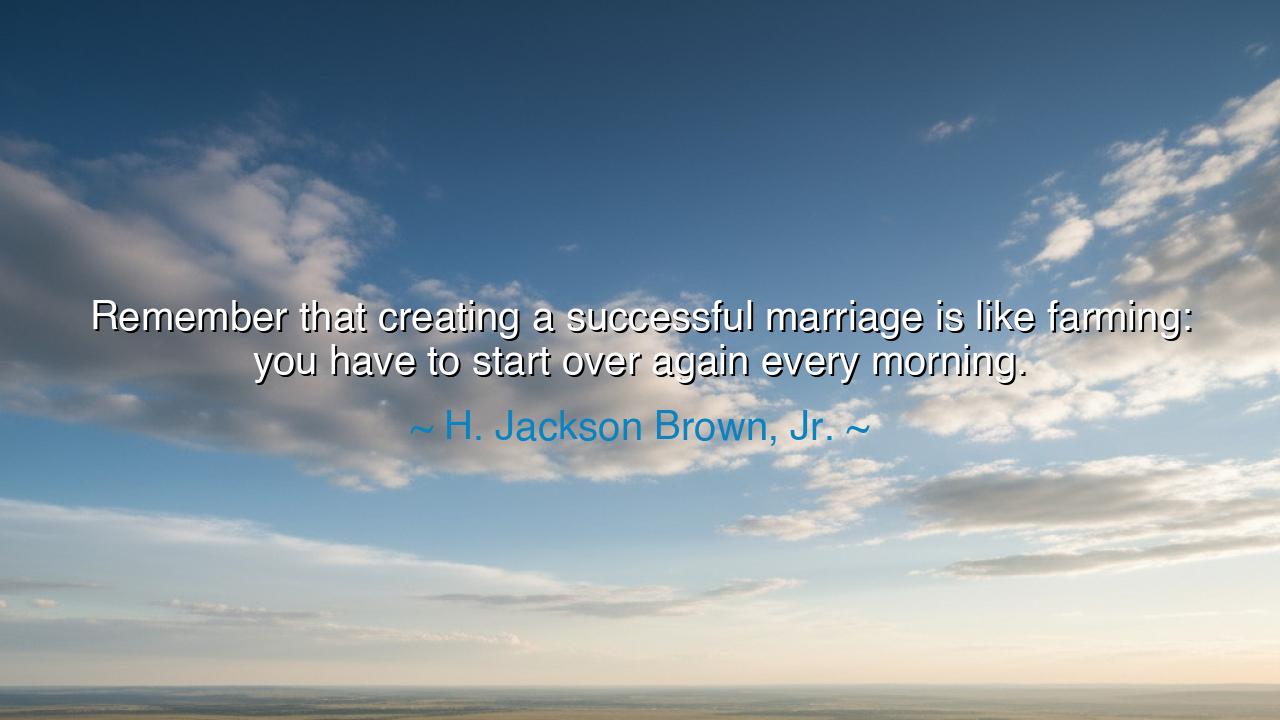
Remember that creating a successful marriage is like farming: you
Remember that creating a successful marriage is like farming: you have to start over again every morning.






When H. Jackson Brown, Jr. wrote, “Remember that creating a successful marriage is like farming: you have to start over again every morning,” he revealed one of the deepest truths about human love — that marriage is not a single harvest, but a lifetime of cultivation. His words, deceptively simple, carry the wisdom of generations. For like the farmer who rises at dawn to tend to his fields, love too demands labor, patience, and constancy. The soil of the heart does not stay fertile on its own; it must be nourished daily with care, forgiveness, and gratitude. In this comparison, Brown teaches that a lasting marriage is not the result of passion alone, but of daily devotion — the humble art of beginning again, no matter what the storms of life may bring.
The origin of this quote comes from Brown’s celebrated work, Life’s Little Instruction Book, a collection of short maxims drawn from everyday wisdom. Brown, a man who often found beauty in simplicity, saw that the truths that guide human happiness are often the same that guide the natural world. His analogy to farming is not poetic fancy; it is a philosophy of endurance. Just as the farmer cannot live on yesterday’s crops, neither can lovers live on yesterday’s affection. Every morning, the soil must be turned, the seeds must be watered, and the weeds of neglect must be removed. In this, Brown captures the sacred rhythm of love — an ongoing act of renewal, never finished, always growing.
To the ancients, this metaphor would have rung true, for they too knew that love, like the earth, obeys the seasons of effort. There are times of planting and times of harvest, times of abundance and times of drought. The wise lover does not despair when the soil is dry, nor grow lazy when the fields are green. They understand that to love is to labor — and that the harvest comes only to those who persevere. Just as the farmer learns to read the signs of the sky, so too must the husband and wife learn to read the moods of one another’s hearts, tending gently to what is fragile, pruning what is excessive, and trusting that with care, the seeds they plant will bloom again.
Consider the story of Eleanor and Franklin Roosevelt, whose marriage endured both triumph and deep personal strain. They faced political storms, public scrutiny, and private heartbreak, yet they remained bound not by romance alone, but by shared purpose and mutual respect. Their love transformed over the years — from passion into partnership, from partnership into legacy. Each morning, they began again: writing letters across continents, standing together in service, forgiving one another’s failings. Like farmers of the heart, they tended to their union through the cycles of time, and in doing so, built something enduring — not perfect, but profoundly human.
In Brown’s comparison lies a warning against the illusion of permanence. Many believe that love, once found, will sustain itself — that the vows spoken at the altar will keep the soil forever rich. But love, left untended, grows cold like fallow ground. It is not the initial planting but the daily tending that keeps it alive. To wake each morning and choose your partner anew — that is the essence of fidelity. For marriage is not a single promise made once, but a promise kept every day, in countless small acts: a kind word, a patient ear, a hand held in silence. These are the plows and seeds of the soul.
There is also humility in this truth. The farmer does not command the rain, nor the lover command the heart. Both must learn gratitude and faith — gratitude for what grows, and faith through the barren seasons. Brown’s wisdom reminds us that love cannot be forced, only nurtured. And when mistakes are made, as they will be, one must not despair, but begin again at sunrise. For every morning offers a new chance to mend what was broken and to sow what was neglected. The sun, in its constancy, becomes a symbol of forgiveness — rising again and again, as love must rise after every storm.
Let this be the lesson carried forward: marriage is a daily harvest, not a single feast. The work of love is never done, and that is its beauty. Those who rise each day to care for their union — with patience, humility, and tenderness — will reap a life of deep companionship. Like the farmer who finds joy not only in the harvest but in the labor itself, so too must lovers find joy in the tending. For love, when cared for daily, does not wither with time; it deepens, it ripens, and it endures. Thus, as Brown teaches, let every sunrise be an invitation to begin again — to water the roots of affection, to clear the weeds of pride, and to remember that love, like the earth, rewards only those who labor faithfully beneath its light.






AAdministratorAdministrator
Welcome, honored guests. Please leave a comment, we will respond soon